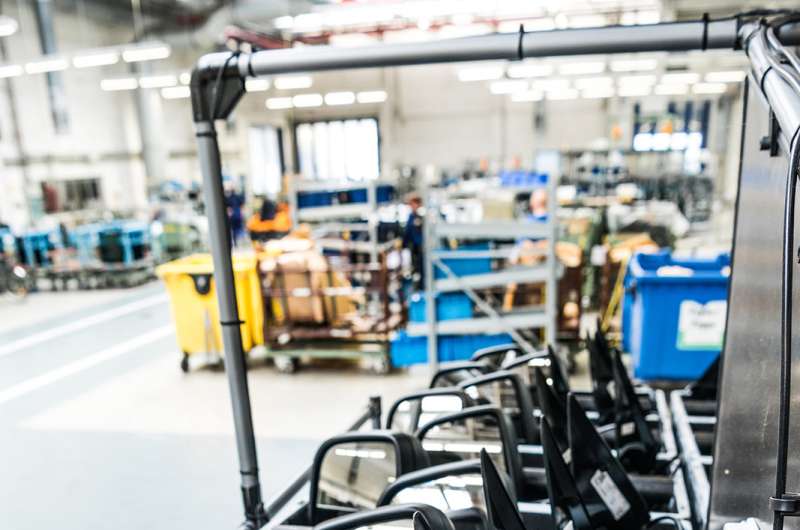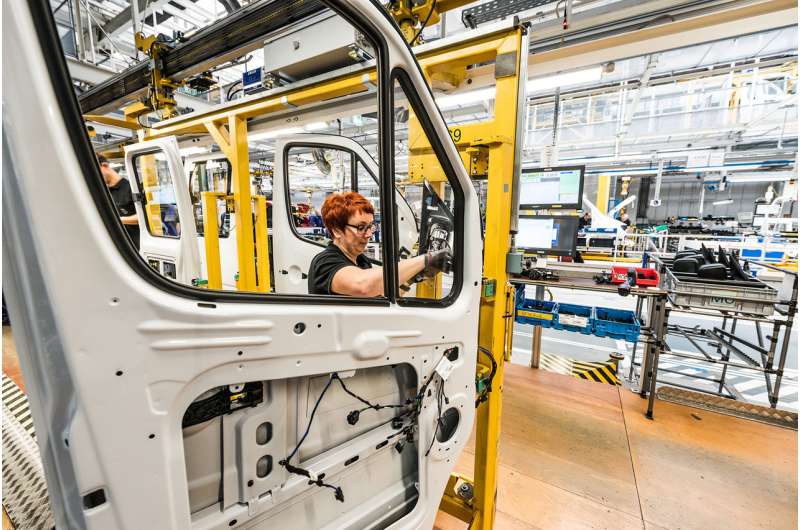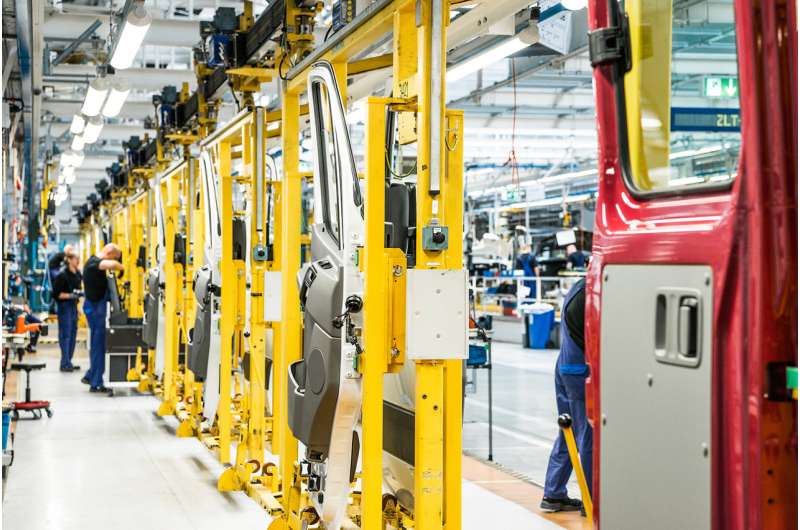A variety of options in motor vehicle manufacturing: Outwardly, many parts are virtually indistinguishable to workers. Credit: Fraunhofer IFF, Andreas Süss
Pressure to optimize is intense on the floors of motor vehicle manufacturers' factories: Variance is steadily increasing. Costs have to be contained. Fraunhofer researchers are now using RFID technology to introduce more transparency in motor vehicle manufacturers' supply chains and manufacturing operations. This reduces time and labor, thus boosting cost effectiveness.
Anyone who has ever ordered a new car knows that the list of options is long. The variety of options is constantly growing. Such customization entails major challenges for carmakers. Outwardly, many parts are virtually indistinguishable to workers – a seatbelt for German cars looks remarkably like one for non-EU cars. That is why safety-related parts are given barcodes, which require manual scanning. In the course of digitization, RFID is freeing employees from this routine task, while automatic inspection simultaneously gives them certainty that they have installed the correct parts.
Boosting Process Reliability and Transparency
Researchers from the Fraunhofer Institute for Factory Operation and Automation IFF in Magdeburg are readying manufacturing and supply chain operations for digitization and Industrie 4.0 respectively. "Radio frequency identification or RFID tags on parts can boost process reliability and efficiency significantly," says Marc Kujath, research scientist at the Fraunhofer IFF. "We have demonstrated this in feasibility studies and wireless tests conducted jointly with Mercedes-Benz Vans at their factory in Ludwigsfelde near Berlin." Such RFID systems consist of RFID tags on parts and a scanner that reads out information optically. In a first step, the researchers analyzed which of the numerous vehicle parts are best suited for this and identified as many as forty parts. For the start, the experts focused on mirrors and seats for further developments.
Interconnected technologies boost process reliability in manufacturing. First, side mirrors and seats were tagged with RFID tags in a pilot phase. Credit: Fraunhofer IFF, Andreas Süss
Automatic Inspection during Assembly
The RFID tags are affixed to every single safety-critical part, individual mirrors for instance. Much like barcode, a serial number is stored on the tags, the major difference being that, whereas barcode merely stores information identifying the type of mirror the number on an RFID tag delivers abundant information such as the vehicle in which a mirror is to be installed. Whereas barcodes have to be read manually with a handheld scanner one by one, RFID tags can all be read automatically and optically at the same time by one scanner – even when the parts have been installed. This means that information can be retrieved from RFID tags in seconds at any given time. This is a crucial advantage for manufacturing. For instance, the installation of all the requisite parts can be verified while a front or rear axle is being mounted. Previously, this was not checked until final inspection – by employees conducting visual inspections and using paper lists. "RFID tags enable us to boost transparency," explains Kujath.
From the Technology to the Operating Specifications through System Integration
The researchers from the Fraunhofer IFF delivered both the technology and the operating specifications. "This required several steps, which we tackled together with our partner Mercedes-Benz Vans. For instance, we reduced the blind spots in production scheduling. This means that a project manager now knows where the snags in the process are located – and can ask the right questions at the right time. We additionally thought the different roles through. A project manager ultimately needs different information than a technician," adds Kujath. Standard tests at Daimler will follow in another step.
RFID technology makes Motor vehicle manufacturers’ supply chain and manufacturing operations more transparent. Credit: Fraunhofer IFF, Andreas Süss
Provided by Fraunhofer-Gesellschaft























